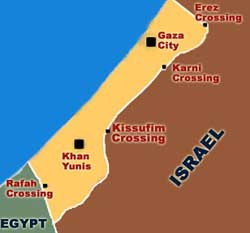Gaza offensive to weigh heavily on Israeli elections
 Tel Aviv - While the Israeli offensive rages in the Gaza Strip, political spectators in Israel are asking what impact the conflict will have on upcoming elections.
Tel Aviv - While the Israeli offensive rages in the Gaza Strip, political spectators in Israel are asking what impact the conflict will have on upcoming elections.
The outcome of Operation Cast Lead will play a big role in determining the results of the election, now little more than three weeks away, as voters decide if the offensive has indeed changed "the security reality" of southern Israeli towns and villages that have been targeted by rockets from the Gaza Strip.
Defence Minister Ehud Barak, Foreign Minister Tzipi Livni and opposition leader Benjamin Netanyahu have all thrown their hat in the ring to be Israel's next prime minister. So far, Barak seems to have profited the most, with his Labour Party gaining about four or five mandates according to opinion polls held before and during the offensive.
The defence minister was considered so unpopular that his campaign advisers decided to use his supposedly unattractive characteristics - trying to turn them from liabilities into assets and by depicting him as a leader who cares less about being popular and more about leading the country.
"Not trendy - a leader. Not sympathetic - a leader, Not nice - a leader," proclaim his campaign posters plastered across billboards throughout the country.
At the onset of the election campaign and shortly before the offensive, Barak's left-to-centre Labour was predicted to get some 11 mandates in the 120-seat Knesset.
Opinion polls published during the offensive, the latest on Thursday, said Labour could now expect to obtain around 15 or 16 mandates.
Barak however is still expected emerge from the elections with fewer mandates than he went into them. Labour, which has 19 mandates in the outgoing Knesset, is expected to drop from its position as the second-largest party to the third, hardly making him a winner.
So far, the real winner seems to be Netanyahu, whose hardline Likud party has re-opened a gap of around four mandates against Kadima, after tying shortly before the offensive. The usually voluble opposition leader has refrained from criticizing the government, or from pointing out that it was now doing what he had been advocating all along. In a calculated show of statesmanship, he has argued that unity is needed in times of war.
The former hawkish premier had done the same during the 2006 war with Lebanon's Hezbollah movement. But as soon as it was over, he took the lead in criticizing the government's handling of it. But in sharp contrast to the Lebanon war, a large majority of Israelis (78 per cent) thus far views the Gaza offensive - which has seen few Israeli casualties - as a success. Only 13 per cent regard it as a failure with the remainder saying they do not know, according to a poll published in the Ha'aretz daily Thursday. The Israeli public is still waiting for the end of the war, to see what kind of political arrangement is in place after it. Only then can it judge to what extent its objectives - significantly reducing Hamas ability to fire rockets and preventing renewed weapons smuggling into Gaza - are met.
But both Barak and Livni are seen as handling the crisis well.
"It was very successful for him," said one Tel Aviv resident, Ziva Hefetz, of the defence minister, although - expressing a widely heard feeling - she added she would not vote for him because "I am not crazy about him. He doesn't have the skills. He already was prime minister once and he wasn't good then."
Instead, the 46-year-old office assistant said she would vote for Livni. "She is coming out as a very strong person. I didn't know her before as such."
With the election campaign frozen for the duration of the offensive, it has given more air time to the leaders of the three big parties at the expense of the smaller parties. It also gave Livni a chance to display the leadership her opponents had accused her of lacking. But this has not yet translated into a visible gain in mandates in the opinion polls. Many Israelis, when asked, still say she lacks the experience to run their country.
Many Palestinians believe Barak, in launching the Gaza offensive, was motivated by his desire to improve his standing in the elections. Some Arab media even dubbed it "Operation Elections."
In fact, Barak seemed much less eager to send troops into Gaza than outgoing caretaker Prime Minister Ehud Olmert, who undoubtedly preferred to end his premiership having dealt a harsh blow to Hamas in Gaza, which many Israelis felt was long overdue, rather than be remembered as the premier hounded out of office by corruption charges.
For Olmert, the Gaza offensive was also a chance to show that he has taken on board the lessons of the second Lebanon war, seen by many Israelis as flawed and over which he had taken much criticism.
Also now, Barak - backed by Livni - favours ending the offensive sooner than Olmert, sparking an open argument held in the media through their advisors. For the time being, Netanyahu appears to be the one feasting on the fruits of victory.
According to Thursday's Ha'aretz poll, his Likud would come in first with 29 mandates, against 25 for Livni's Kadima, if elections were held today.
But the daily pointed out that a quarter of those asked were still undecided, adding: "the story is far from over." (dpa)